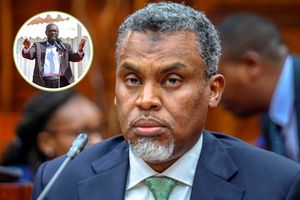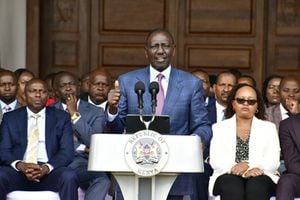Professors Charles Fombard and Migai Akech seek to join BBI case

Prof Migai Akech, an associate professor of law at the University of Nairobi School of Law.
Two law lecturers want to join the Building Bridges Initiative (BBI) legal battle at the Court of Appeal as interested parties and friends of the court during the hearing of five appeals filed against a High Court judgment that blocked constitutional changes.
Prof Charles Manga Fombard from Pretoria and Prof Migai Akech (Kenyan) made the last minute rush to court on Friday morning and filed their applications, which were certified urgent and fixed for hearing on Monday morning ahead of the appeals' hearing.
In the applications filed separately, the two scholars intend to argue that the High Court erred and misapplied the applicability of the Basic Structure doctrine and eternity provisions in the Constitution of Kenya.
They wish to make submissions on constitutionality of the BBI -Constitution of Kenya Amendment Bill (2020) -that proposed 74 amendments. They will make arguments on the several aspects of the process that led to the Bill being advanced to a popular initiative.
They further wish to submit limits to the amendment powers set out in Article 255 -257 of the Constitution.
Unamendable sections
Prof Fombad, in his brief, says that the High Court introduced Constitutional vagueness by declaring that the Constitution of Kenya has a Basic Structure, which meant there are unamendable sections.
He says the vagueness could set a precedent that is dangerous for the survival of the Constitution, Constitutionalism and the law of law. Further, the adoption of the Basic Structure doctrine may see conflict between the three arms of government.
"Adoption of the Basic Structure in Africa could in some situations create a gridlock which may provoke unnecessary conflict and a temptation to alter the Constitution through extra constitutional means," says Prof Fombad.
Instead, he says courts should focus on strategies to enhance the constitutional amendment procedure provided for in the Constitution rather than 'taking a leap into the unknown world of India's Basic Structure Doctrine and its imponderables'.
"Such judicial adventurism is counterproductive to the positive strides made in many countries such as Kenya and South Africa to interpret the Constitution in a progressive manner, " says Prof Fombad.
Practical problems
Among the arguments and perspectives he intends to introduce in court are theoretical and practical problems of judicial imposition of the Basic Structure doctrine.
He is a professor of law and head of the African Comparative Constitutional Law unit, Institute for International and Comparative law in Africa (ICLA), faculty of law university of Pretoria.
He says he has previously acted as a Constitutional expert in judicial matters. For instance, in February this year, he was admitted in a court based in Montreal, Canada, to testify on the question of the workings of the legal systems in Cameroon.
Prof Akech, on his part, says the High Court introduced hurdles in the people's power to amend a Constitution.
He says the court made it difficult, cumbersome and expensive by ruling the amendment process should involve four steps including making of a people's constituent assembly. He is an associate professor of law at the University of Nairobi School of Law.
He also says that contrary to the High Court finding, the 2010 Constitution was the outcome of a political settlement. Hence, the amendment should be open to the people and their representatives through similar settlements particularly given that the settlements may need to be renegotiated from time to time.
Political settlement
"Political settlements on Constitutional reform or amendment initiatives should be encouraged. It is difficult to justify a claim that the people cannot be able to amend the provisions of the Constitution that in significant aspects was the outcome of a political settlement," says Prof Akech.
He argues that the proposal to amend the Constitution should be open to the people to either endorse or reject through a referendum.
"The courts should therefore view political compromises such as the Building Bridges Initiative (BBI) and the resulting Constitution of Kenya Amendment Bill 2020 from this perspective," he says.
Prof Akech explains that "the Bill seeks to amend the Constitution to address important governance challenges on which Kenyans remain divided, particularly the system of government, which contributed significantly to the divisive Presidential elections of 2013 and 2017".
Should they be admitted to the BBI case, the two say they will provide independent and impartial opinion to the court to facilitate a comprehensive examination and consideration of the issues.
Both have conducted extensive research on diverse aspects of Constitutional developments and Constitutionalism.
Their expertise include governance and authoring journal publications and books.





